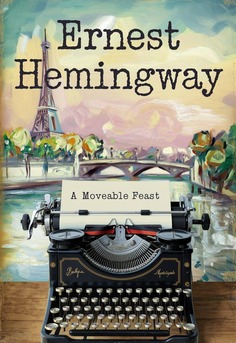1. What does the title "A Movable Feast" mean in the context of this book? Discuss the significance of Hadley's comment, "memory is hunger," in relation to the title.
2. Hemingway devotes entire chapters to characterizing his friends. Discuss some of these relationships. Which of his friends were difficult? Did he respect some more than others? What did friendship mean to him? Were his characterizations honest and from the heart? His relationship with several people changed over the course of the book. F. Scott and Gertrud Stein in particular. Discuss these changes.
3. Discuss Hemingway's philosophy of writing and how his writing style follows this philosophy. He makes several references to writing "one true sentence to build on" and also mentions that he often omits critical plot points to make readers think and ponder.
4. Talk about the relationship Hemingway had with food. Throughout the book, there are many references to hunger. There is also a chapter titled "Hunger is Good Discipline". Do you think he was as poor and unable to buy food as he portrays himself to be in the book? Did he use food as a reward or as motivation to write and earn his living as a writer?
5. Overall, how would you describe his life during these years in Paris? Was he content? Why do you think he was happiest spending time in the mountains with Hadley and his son?
6. Talk about the tone of the book. Overall is it more pleasant and reminiscent of happy times or sad indicating regret and longing for times past?
7. How does Hemingway portray Hadley? It's been said the book is a tribute to Hadley. And she was the one woman he truly loved. What do you think? Do you think he has any regrets about his treatment of Hadley? Why do you think their marriage failed?
8. Compare his portrayal of Hadley to his portrayal of Zelda, F. Scott Fitzgerald's wife. He devotes a big portion of the book to his relationship with F. Scott and Zelda. Talk about how his relationship with F Scott progressed and changed.
9. "A Movable Feast" is written from the perspective of Hemingway, the successful writer, looking back on his early years. Do you think he is as critical of his own behavior as he is of his friends? Does he pass judgment on his younger self?
10. Hemingway does not go into a lot of detail about his relationship with Pauline. He does relate his torment and also intimates that he was somewhat the victim. Discuss how you feel about this. Although most of the book is in first person, when talking about Pauline, he uses the third person. Talk about the significance of this.
Questions by PBR. Please feel free to use them with acknowledgment.

















